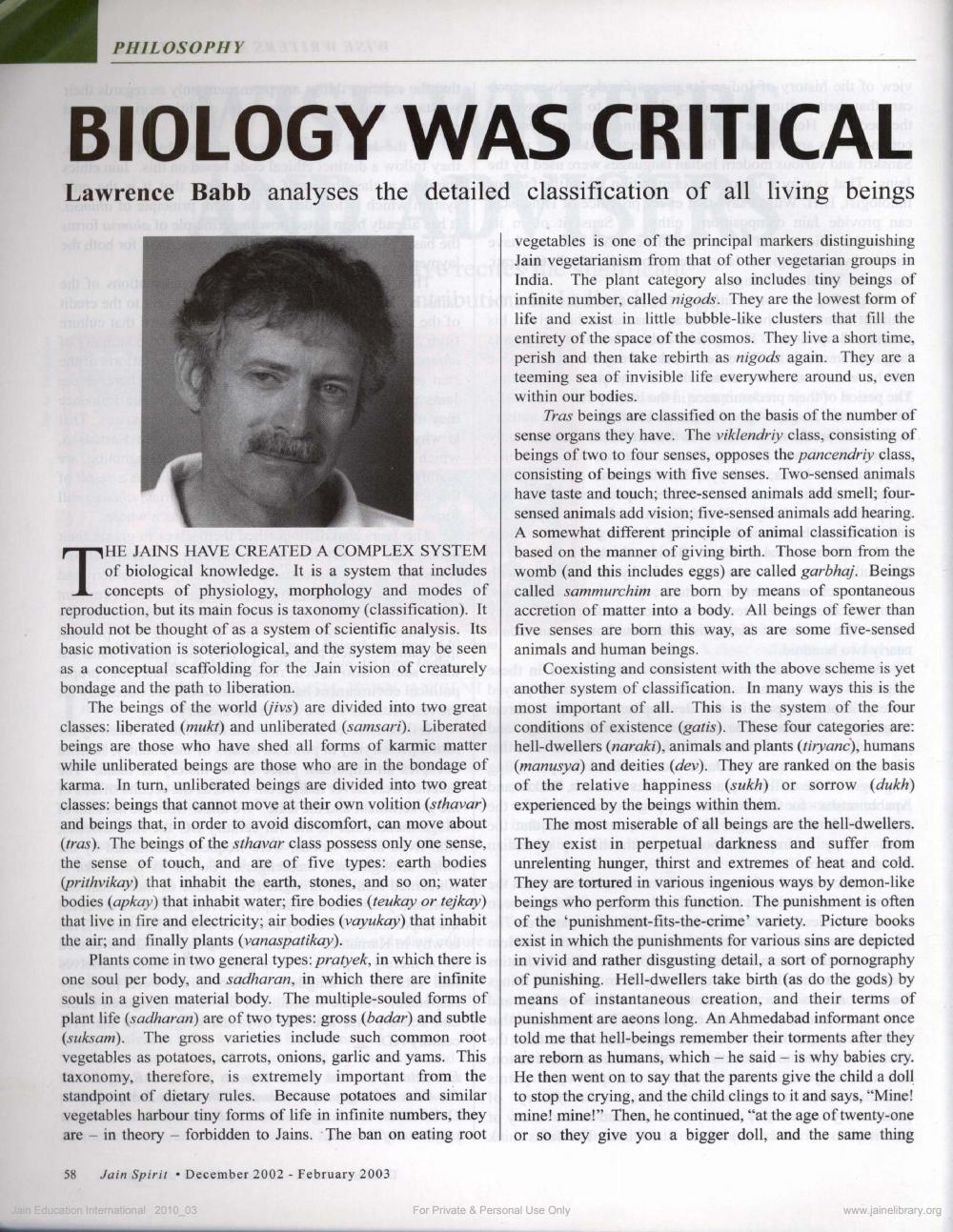________________
PHILOSOPHY
BIOLOGY WAS CRITICAL
Lawrence Babb analyses the detailed classification of all living beings
THE JAINS HAVE CREATED A COMPLEX SYSTEM
of biological knowledge. It is a system that includes
concepts of physiology, morphology and modes of reproduction, but its main focus is taxonomy (classification). It should not be thought of as a system of scientific analysis. Its basic motivation is soteriological, and the system may be seen as a conceptual scaffolding for the Jain vision of creaturely bondage and the path to liberation.
The beings of the world (ivs) are divided into two great classes: liberated (mukt) and unliberated (samsari). Liberated beings are those who have shed all forms of karmic matter while unliberated beings are those who are in the bondage of karma. In turn, unliberated beings are divided into two great classes: beings that cannot move at their own volition (sthavar) and beings that, in order to avoid discomfort, can move about (tras). The beings of the sthavar class possess only one sense, the sense of touch, and are of five types: earth bodies (prithvikay) that inhabit the earth, stones, and so on; water bodies (apkay) that inhabit water; fire bodies (teukay or tejkay) that live in fire and electricity; air bodies (vayukay) that inhabit the air, and finally plants (vanaspatikay).
Plants come in two general types: pratyek, in which there is one soul per body, and sadharan, in which there are infinite souls in a given material body. The multiple-souled forms of plant life (sadharan) are of two types: gross (badar) and subtle (suksam). The gross varieties include such common root vegetables as potatoes, carrots, onions, garlic and yams. This taxonomy, therefore, is extremely important from the standpoint of dietary rules. Because potatoes and similar vegetables harbour tiny forms of life in infinite numbers, they are - in theory - forbidden to Jains. The ban on eating root
vegetables is one of the principal markers distinguishing Jain vegetarianism from that of other vegetarian groups in India. The plant category also includes tiny beings of infinite number, called nigods. They are the lowest form of life and exist in little bubble-like clusters that fill the entirety of the space of the cosmos. They live a short time, perish and then take rebirth as nigods again. They are a teeming sea of invisible life everywhere around us, even within our bodies.
Tras beings are classified on the basis of the number of sense organs they have. The viklendriy class, consisting of beings of two to four senses, opposes the pancendriy class, consisting of beings with five senses. Two-sensed animals have taste and touch; three-sensed animals add smell; foursensed animals add vision; five-sensed animals add hearing. A somewhat different principle of animal classification is based on the manner of giving birth. Those born from the womb (and this includes eggs) are called garbhaj. Beings called sammurchim are born by means of spontaneous accretion of matter into a body. All beings of fewer than five senses are born this way, as are some five-sensed animals and human beings.
Coexisting and consistent with the above scheme is yet another system of classification. In many ways this is the most important of all. This is the system of the four conditions of existence (gatis). These four categories are: hell-dwellers (naraki), animals and plants (tiryanc), humans (manusya) and deities (dev). They are ranked on the basis of the relative happiness (sukh) or sorrow (dukh) experienced by the beings within them.
The most miserable of all beings are the hell-dwellers, They exist in perpetual darkness and suffer from unrelenting hunger, thirst and extremes of heat and cold. They are tortured in various ingenious ways by demon-like beings who perform this function. The punishment is often of the 'punishment-fits-the-crime' variety. Picture books exist in which the punishments for various sins are depicted in vivid and rather disgusting detail, a sort of pornography of punishing. Hell-dwellers take birth (as do the gods) by means of instantaneous creation, and their terms of punishment are aeons long. An Ahmedabad informant once told me that hell-beings remember their torments after they are reborn as humans, which - he said - is why babies cry. He then went on to say that the parents give the child a doll to stop the crying, and the child clings to it and says, "Mine! mine! mine!" Then, he continued, at the age of twenty-one or so they give you a bigger doll, and the same thing
58
Jain Spirit . December 2002 - February 2003
Jain Education International 2010_03
For Private & Personal Use Only
www.jainelibrary.org




